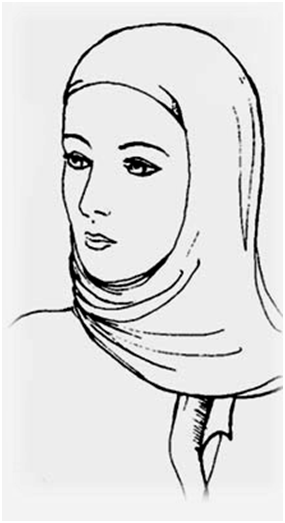
If, then, He takes away anxious care for clothes and food, and superfluities in general, as unnecessary; what are we to imagine ought to be said of love of ornament, and dyeing of wool, and variety of colors, and fastidiousness about gems, and exquisite working of gold, and still more, of artificial hair and wreathed curls; and furthermore, of staining the eyes, and plucking out hairs, and painting with rouge and white lead, and dyeing of the hair, and the wicked arts that are employed in such deceptions?Clement of Alexandria (A.D. 195) Ante-Nicene Fathers vol.2 pg.264
So those women who wear gold, occupying themselves in curling at their locks, and engaged in anointing their cheeks, painting their eyes, and dyeing their hair, and practicing the other pernicious arts of luxury, decking the covering of flesh, in truth, imitate the Egyptians, in order to attract their infatuated lovers. Clement of Alexandria (A.D. 195) Ante-Nicene Fathers vol.2 pg.272
Unawares the poor wretches destroy their own beauty, by the introduction of what is spurious. At the dawn of day, mangling, racking, and plastering themselves over with certain compositions, they chill the skin, furrow the flesh with poisons, and with curiously prepared washes, thus blighting their own beauty. Wherefore they are seen to be yellow from the use of cosmetics, and susceptible to disease, their flesh, which has been shaded with poisons, being now in a melting state. So they dishonor the Creator of men, as if the beauty given by Him were nothing worth. As you might expect, they become lazy in housekeeping, sitting like painted things to be looked at, not as if made for domestic economy. Clement of Alexandria (A.D. 195) Ante-Nicene Fathers vol.2 pg.272
But there are circumstances in which this strictness may relaxed. For allowance must sometimes be made in favor of those women who have not been fortunate in falling in with believing husbands, and adorn themselves in order to please their husbands. But let desire for the admiration of their husbands alone be proposed as their aim. Clement of Alexandria (A.D. 195) Ante-Nicene Fathers vol.2 pg.285
Nor are the women to smear their faces with the ensnaring devices of wily cunning. But let us show to them the decoration of sobriety. Clement of Alexandria (A.D. 195) Ante-Nicene Fathers vol.2 pg.286
But why are we a (source of) danger to our neighbor? Why do we import concupiscence into our neighbor? …Are we to paint ourselves out that our neighbors may perish? Where, then, is (the command), “You shall love your neighbor as yourself”? Tertullian (A.D. 198) Ante-Nicene Fathers vol.4 pg.19
For they who rub their skin with medicaments, stain their cheeks with rouge, make their eyes prominent with antimony, sin against HIM. To them, I suppose, the plastic skill of God is displeasing! In their own persons, I suppose, they convict, they censure, the Artificer of all things! For censure they do when they amend, when they add to, (His work;) taking these their additions, of course, from the adversary artificer. That adversary artificer is the devil. For who would show the way to change the body, but he who by wickedness transfigured man’s spirit? He it is, undoubtedly, who adapted ingenious devices of this kind; that in your persons it may be apparent that you, in a certain sense, do violence to God. Whatever is born is the work of God. Whatever, then, is plastered on (that), is the devil’s work. Tertullian (A.D. 198) Ante-Nicene Fathers vol.4 pg.20-21
But are sincerity and truth preserved, when what is sincere is polluted by adulterous colors, and what is true is changed into a lie by the deceitful dyes of medicaments? Your Lord says, “You canst not make one hair white or black;” and you, in order to overcome the word of your Lord, will be more mighty than He, and stain your hair with a daring endeavor and with profane contempt. With evil presage of the future, you make a beginning to yourself already of flame-colored hair; and sin (oh, wickedness!) with your head – that is, with the nobler part of your body! And although it is written of the Lord, “His head and His hair were white like wool or snow,” you curse that whiteness and hate that hoariness which is like to the Lord’s head. Cyprian (A.D. 250) Ante-Nicene Fathers vol.5 pg.434
